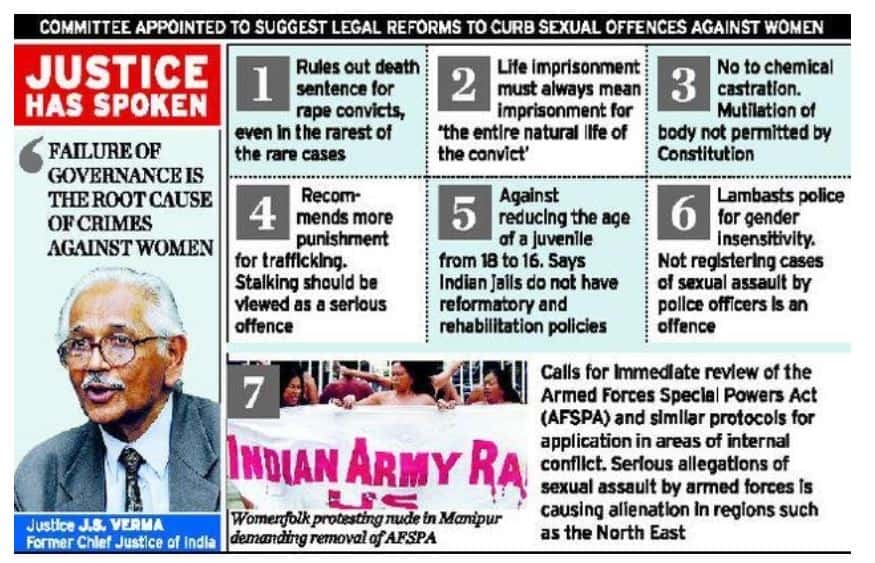UPSC Articles
Indian Governance
Topic: General Studies 2:
- Government policies and interventions for development in various sectors and issues arising out of their design and implementation.
Capital Punishment
Context: Four convicts in Nirbhaya gangrape and murder case were hanged to death at Tihar jail in Delhi.
The last death sentence executed by the justice system in India was the 30 July 2015 hanging of terrorist Yakub Memon, who was convicted in the 1993 Mumbai blasts.
In 2012, the government, post Nirbhaya incident, set up the Justice J.S. Verma Committee to look into rape laws.
- The report led to stringent changes through the Criminal Law (Amendment) Act, 2013

FINAL DNA- 21 MARCH 2020
Pic Source
- On the imposition of the death penalty, the government went against what the Verma report had suggested — that seeking such a punishment “would be a regressive step in the field of sentencing and reformation”.
- However, several recommendations were simply not considered, some of which are
- Those Charged with Sexual Crimes cannot contest Polls
- Make Marital Rape an offence
- Bring Sexual Crimes by armed Forces under Criminal Law
Now, repeat offenders in rape cases can be awarded the death sentence.
However, there has not been significant improvement over safety & security of women
- As per NCRB data a total of 3.78 lakh cases of crimes against women were recorded across India in 2018 compared to 3.59 lakh in 2017 and 3.38 lakh in 2016.
- The total number of rape cases in 2018 was pegged at 33,356, of which Madhya Pradesh registered 5,450 rapes, the maximum in 2018.
- The crime rate per one lakh women population was 58.8 in 2018 compared to 57.9 in 2017. At the end of 2018, 33.6% cases were pending police investigation.
It is in this light that, Criminologists and Socialists have for long been demanding abolition of the death penalty on the grounds that it is inhumane and out of the purview of Social Contract.
Arguments in Favour of Death Penalty:
- Deterrent effect: By executing convicted criminals, we would be able to deter would-be-criminals from committing heinous crimes in future.
- Retribution: One of the key principles of retribution is that people should get what they deserve in proportion to the severity of their crime. Thus death penalty needs to awarded to those who commit severe crimes
- Closure for Victim’s family: Death penalty is said to provide emotional closure for victims of crimes
Arguments against the Death Penalty
- No Strong evidence to show that death penalty is an effective deterrent to crime.
- Death has been prescribed as a punishment for murder since 1860 (the year IPC was drafted), still, murders continue unabated.
- Death has been prescribed in rape cases since 2013 (376A), still, rapes continue to happen and in fact, the brutality of rapes has increased manifold.
- Execution of the Innocent: The most common argument against capital punishment is that sooner or later, innocent people may get killed, because of mistakes or flaws in the justice system.
- Moral grounds: Human rights activists argue that death penalty is sanitised form of vengeance and takes away the scope of reform/rehabilitate in criminals
- Natural Rights: State is an institution created by Man whose primary purpose is to protect life. It is not within the purview of State to take away life which is given by God/Nature.
Supreme Court on Death Penalty
- Jagmohan Singh v. State of UP 1973 case: According to Article 21 deprivation of life is constitutionally permissible if that is done according to the procedure established by law.
-
- Rajendra Prasad v. State of UP 1979 case: If the murderous operation of a die-hard criminal jeopardizes social security in a persistent, planned and perilous fashion then his enjoyment of fundamental rights may be rightly annihilated.
- Bachan Singh v. the State of Punjab 1980 case: Death penalty is not to be awarded except in the ‘rarest of rare cases’ when the alternative option is unquestionably foreclosed.
- Machhi Singh v. State of Punjab 1983 case: The Supreme Court laid down certain considerations for determining whether a case falls under the category of rarest of rare cases or not.
Conclusion
- Deterrence is most effective when the punishment happens soon after the crime. The more the legal process distances the punishment from the crime – either in time, or certainty – the less effective a deterrent the punishment will probably be.
- It’s not the severity, but the certainty of punishment which can act as a deterrent.
Connecting the dots:
- 35th Law Commission report on Death Penalty
- Capital Punishment in other countries














